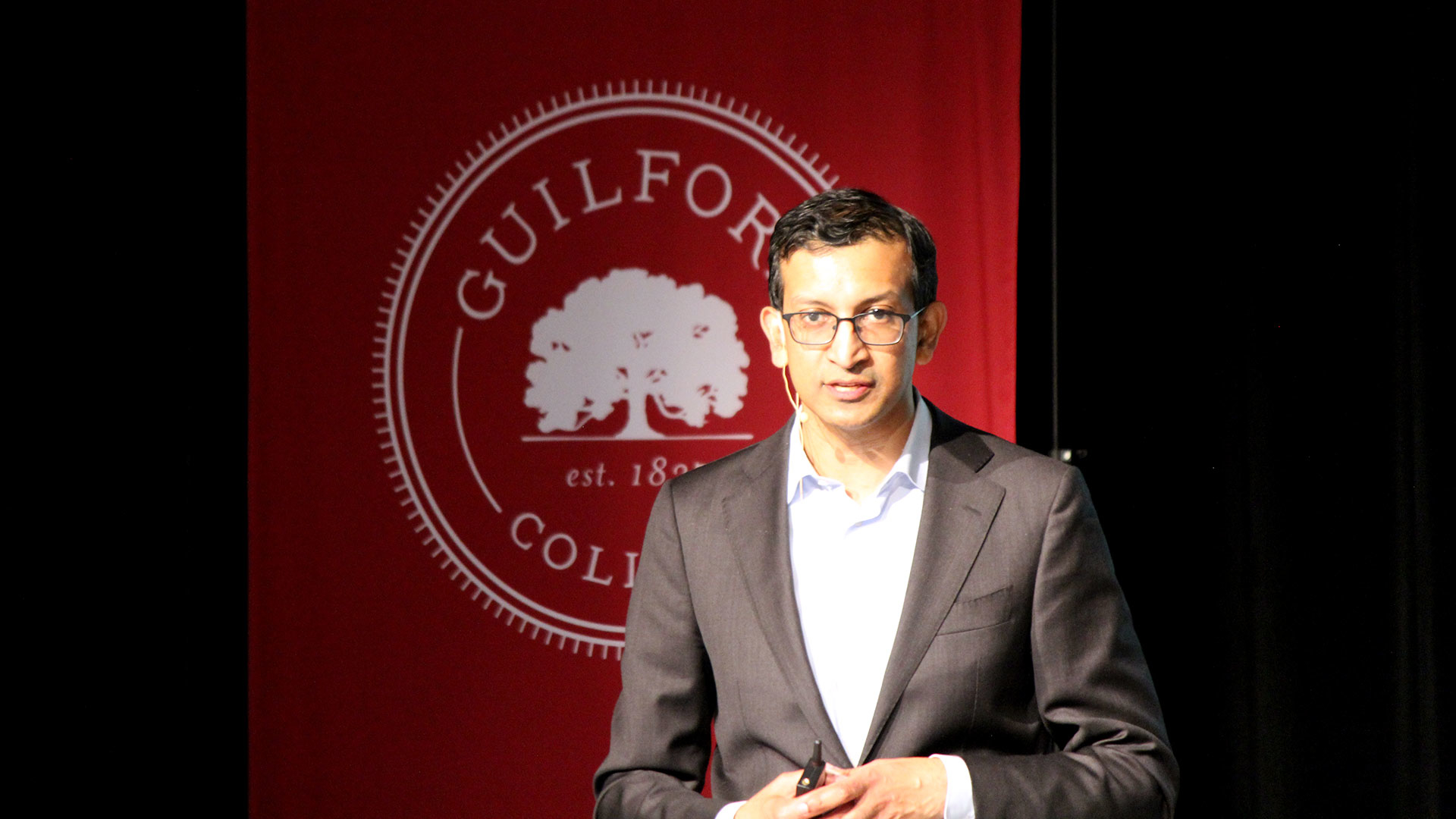
The Harvard economist says upward mobility is frequently connected to where a child grows up, but that can be changed.
In his keynote address at Thursday night’s Guilford Dialogues, Harvard economist Raj Chetty offered a sophisticated presentation of big data to map out what he called “the fading of the American Dream” for many minorities before offering strategies for reversing that trend.
Chetty showed how anonymized tax data helped him trace the geography of upward mobility within the United States. He pointed to the enormous variation in children's chances of rising up out of poverty across the map, highlighting areas of high upward mobility indicated in blue and green—in the center of the country and the coasts—with red and orange signaling lower upward mobility, like in Greensboro and the rest of the Southeast U.S.
“It’s often about what side of the street you live on that is the biggest predictor of mobility,” Chetty told a packed room at the College’s Sternberger Auditorium in Founders Hall.
Chetty said there are ways cities like Greensboro can reverse the collective futures of children in impoverished neighborhoods. One way is to move students from those neighborhoods into other, more affluent neighborhoods where there is access to better schools, grocery stores and medical facilities.
Take a look at a gallery of photos from the first day of Guilford Dialogues
“Obviously that’s not always an easy solution,” says Chetty, who said cities and businesses should be making “strategic investments” in impoverished neighborhoods. A third option, Chetty said, is to “amplify” the roles of colleges and universities to students in those low-income neighborhoods.
Chetty told attendees real-world impacts – including in Greensboro – are being seen from this research. For one, the Housing and Urban Development Agency has redesigned some affordable-housing policies to increase access to higher-opportunity neighborhoods, and cities have undertaken new job-training programs as part of broader place-based initiatives.
Chetty’s remarks capped a lively day of discussions on economic inclusion at Guilford Dialogues. Earlier in the day speakers and attendees discussed ideas and strategies already in place around the country that are creating local economies that are working for everyone.
Sharon Contreras, CEO of the Innovation Project, a nonprofit collaborative working group of state school districts superintendents, told attendees the bedrock for a thriving, inclusive economy begins with a strong public education system geared. She said businesses need to work with local governments to tear down the bureaucratic and physical barriers of outdated school systems.
Contreras pointed to an alliance formed between big business and Greenville, S.C., a former textile-manufacturing city, to rebuild every elementary, middle and high school in the city over six years. Many of those high schools were designed with the local manufacturers in mind. Today the same workers who had previously produced textiles are now making tires and luxury vehicles alongside younger workers for Michelin and BMW.
These days about 45 people are moving to Greenville County every day to join the ranks in the advanced manufacturing sector, which now includes companies like GE and 3M in and roughly 700 other manufacturers employing 500,000 people. “BMW and these businesses came to the community because they built a public-private collaboration,” says Contreras.
The same strategy can happen in Greensboro, says Conteras. “(Guilford Technical Community College needs buildings. Guilford College needs tech upgrade facilities, North Carolina A&T does, too,” says Contreras. “We shouldn't be building the same old spaces in the K-12… when you can build early college high schools, middle college high schools, right on the campuses,” that can provide training specifically geared to local manufacturing firms.
The first day of Guilford Dialogues touched on a variety of topics that help foster economic inclusion including fostering entrepreneurship in communities, recognizing the strengths older workers can bring to a workplace, and building and maintaining affordable housing for everyone.
Guilford Dialogues wraps up Friday with panelists looking at wealth transfer across generations, the role colleges and universities can play in supporting students from diverse socioeconomic backgrounds and community members entering the workforce after serving time in prison.

